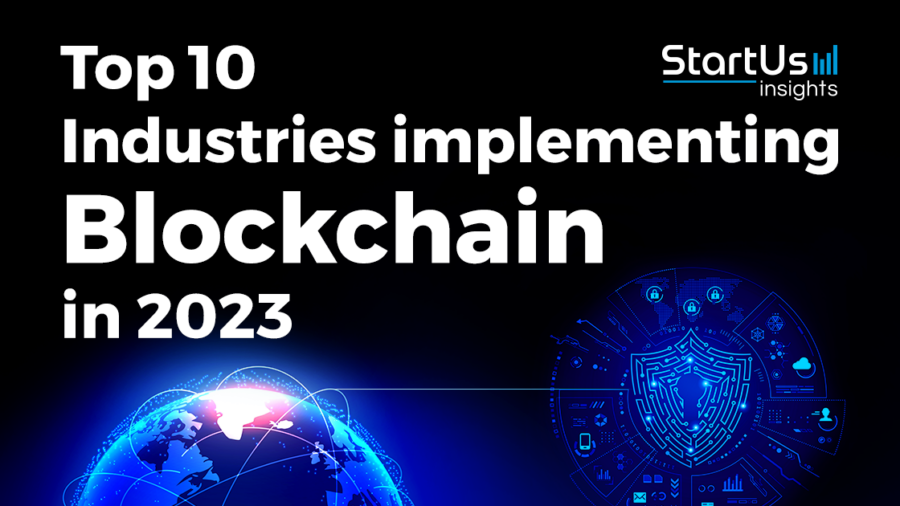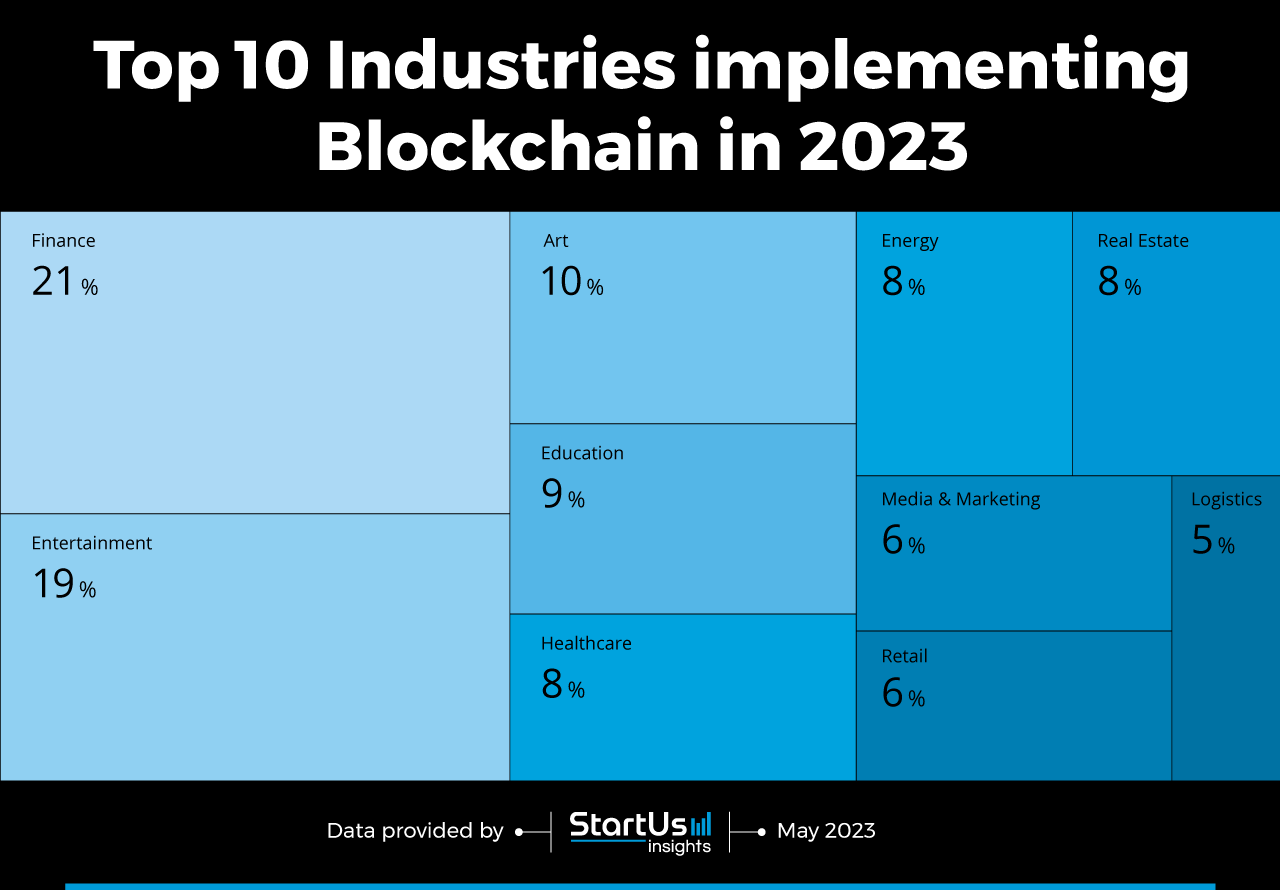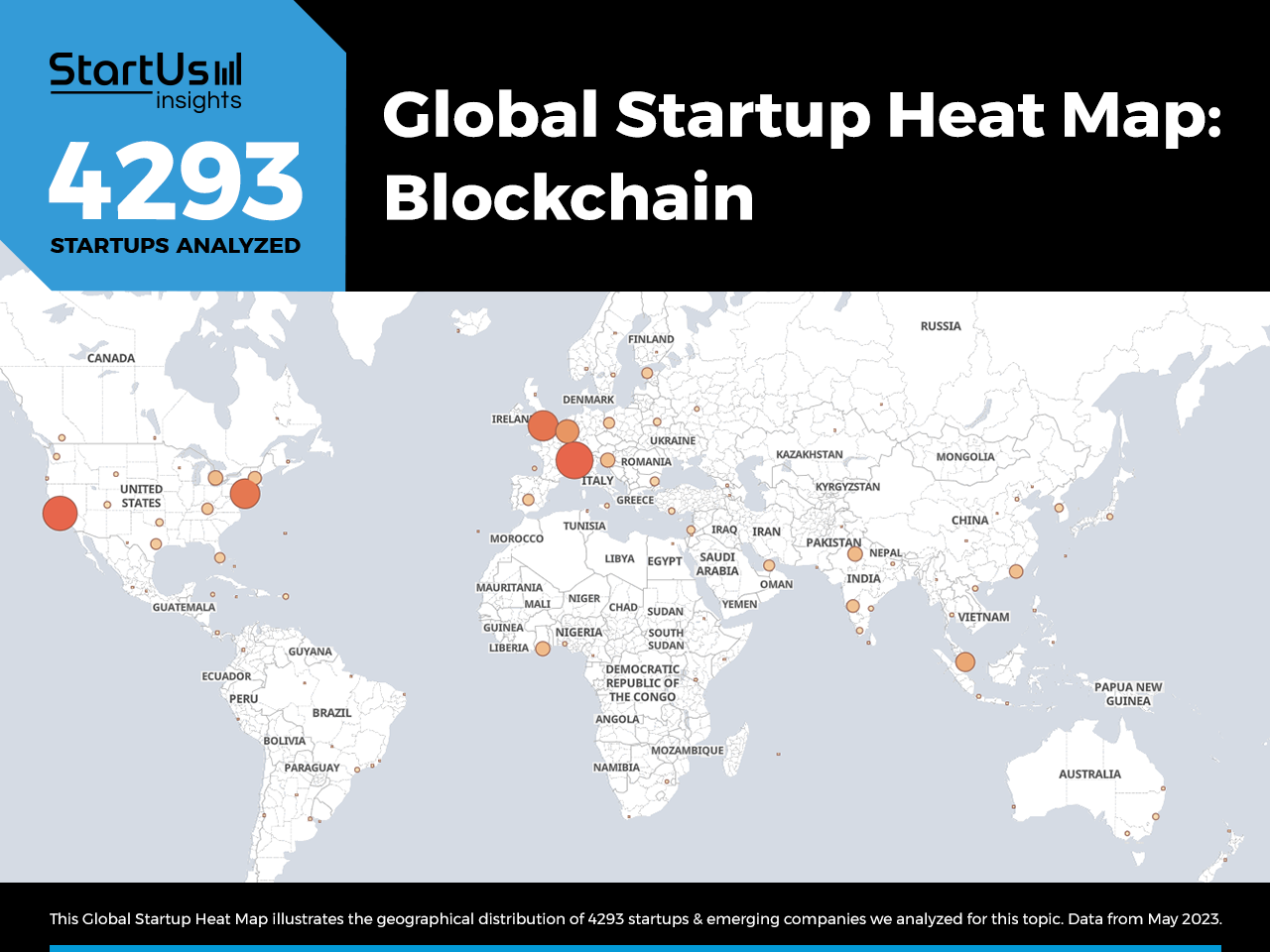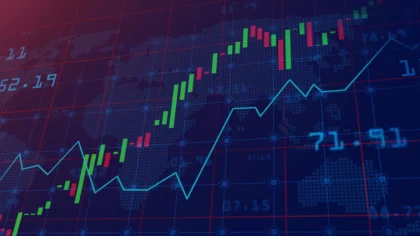Blockchain technology enables transparent supply chains, immutable digital identities, decentralized finance (DeFi), and secure peer-to-peer (P2P) transactions. Businesses are using smart contracts to authenticate or perform transactions while blockchain streamlines automated agreements, and transforms voting systems, ensuring transparency and integrity. It provides a decentralized and secure means for recording and verifying transactions, reducing the need for intermediaries. As a result, blockchain enables transparent and auditable supply chains, combats counterfeiting, and ensures ethical sourcing. This, in turn, enables new business models and unlocks opportunities across various sectors. In this research, you will find the top use cases of blockchain across 10 industries based on our analysis of 4200+ emerging companies.
Tree Map reveals the Impact of Blockchain on 10 Industries
The Tree Map below illustrates the top examples of blockchain across 10 industries in 2023 and 2024. Blockchain enables secure and transparent peer-to-peer transfers and decentralized digital currencies. It empowers artists, content creators, and entertainment businesses by establishing provenance and facilitating transparent transactions for digital assets and media. The education and healthcare industry leverages blockchain to enhance data security and ensure the privacy and integrity of educational and medical records.
The application of blockchain also streamlines energy trading and property transactions, ensuring efficient P2P exchanges and transparent ownership records. The media, marketing, and retail industries utilize blockchain to eliminate intermediaries and enhance transparency. Finally, blockchain enhances supply chain management by providing immutable tracking, improving transparency, and supporting goods and transactions authentication.
Global Startup Heat Map covers 4293 Blockchain Startups & Scaleups
The Global Startup Heat Map below highlights the global distribution of the 4293 exemplary startups & scaleups that we analyzed for this research. Created through the StartUs Insights Discovery Platform that covers 3 790 000+ startups & scaleups globally, the Heat Map reveals that Western Europe has a high concentration of blockchain companies, followed by the US.
Below, you get to meet 10 out of these 4293 promising startups & scaleups as well as the solutions they develop. These blockchain startups are hand-picked based on criteria such as founding year, location, funding raised, & more. Depending on your specific needs, your top picks might look entirely different.
Top Blockchain Applications across 10 Industries (2023 & 2024)
1. Finance
Blockchain enhances secure and transparent payments and services in the finance sector. It accelerates cross-border payments by eliminating intermediaries and central authorities, making transactions more cost-effective. Blockchain streamlines the payment and remittance processes, reducing settlement times and significantly reducing costs.
It also enables authentication of documentation, reducing operational risks and enabling real-time verification of financial status. Moreover, businesses utilize blockchain platforms to streamline invoice management and billing by automating verification and reducing fraud. The banking industry and non-banking financial institutions (NBFCs) are thus able to increase their efficiency, security, and trust in operations with blockchain.
BankSocial develops a Decentralised Banking Platform
BankSocial is a US-based startup that offers a decentralized banking platform for peer-to-peer lending and financial services. Using smart contracts, it automates lending and ensures secure, transparent transactions.
Customers benefit from cross-border lending and international currency exchange. BankSocial’s platform saves transactional fees, improves cash flow, and provides access to new capital sources. The platform also verifies the identity of each individual or business that uses the platform to ensure transactional transparency.
2. Entertainment
Blockchain addresses challenges in the entertainment industry such as revenue distribution, copyrights, piracy, and fraud. Gamers leverage blockchain to buy and exchange digital assets like skins, weapons, and characters on decentralized platforms. In-game purchases also benefit from secure and transparent cryptocurrency transactions, replacing traditional fiat currencies. In movie-making, blockchain aids in fundraising, royalty distribution, and anti-piracy efforts by offering a digital ledger of ownership and rights.
Movie studios also use blockchain and non-fungible tokens (NFTs) for film-related collectibles and commercialization. Amateurs and professionals in esports benefit from blockchain by streamlining processes such as prize money distribution, media rights acquisition, and advertising. Musicians embrace blockchain to retain control over their content, better monetize their work, and establish direct connections with fans.
Neon Link makes a Blockchain Game Development Kit
UK-based startup Neon Link offers game developers a blockchain-based game development platform. It allows web3 game developers to easily plug into the network with its software development kit (SDK) and Ethereum virtual machine (EVM) compatibility.
The platform also features in-game purchases to royalty from secondary purchases of in-game on-chain assets. It enables developers to access a community of game developers to help with game development. Further, the platform allows game developers and publishers to reach a global audience with inbuilt audience reach tools.
3. Art
The use of blockchain enables artists to enhance the provenance, security, and ownership of artistic assets. Brands are developing platforms to track artwork ownership, authenticate digital art, and establish decentralized marketplaces. Art galleries are using NFTs to represent artworks and various digital content to avoid theft.
Blockchain also enables studios to track artwork ownership to combat fraud and theft, securing artworks against unauthorized access and tampering. Further, it enables the establishment of decentralized P2P marketplaces, significantly diminishing conventional art dealer fees and fostering cost efficiency and fairer art transactions.
Art Innovation provides a Blockchain-powered Art Gallery
Art Innovation is an Italian startup that offers a blockchain-powered digital art gallery. It showcases digital art worldwide using the Ethereum blockchain to monitor art ownership. Artists use the platform to directly sell their creations to collectors, enabling secure and transparent digital art transactions.
The startup generates unique tokens for each artwork that contain details like artist information, work titles, and creation dates. By acquiring a piece, collectors obtain the corresponding token as proof of ownership. Artists retain a higher portion of their earnings from artwork sales by bypassing intermediaries. This increased profitability allows artists to invest more in their artistic practice and further develop their skills.
4. Education
Blockchain in education enhances record-keeping, accreditation, financing, and learning. In record-keeping, it ensures the security and integrity of student academic records, reducing fraud and simplifying credit transfers. Academies are also integrating blockchain to authenticate university accreditations as well as job profiles for academic hiring and scholarships.
Transparent tracking of student loans and payments with blockchain further streamlines the loan process. Additionally, decentralized learning platforms enable students worldwide to learn securely and interact privately. By making education secure, transparent, and accessible, blockchain enhances the overall learning experience.
Edufex designs a Blockchain-driven eLearning Platform
German startup Edufex provides a blockchain-based eLearning platform. It provides students with subject classes, topic-oriented videos, assessments, online educator assistance, certification, and university degrees. The use of blockchain makes data storage secure and difficult to hack.
The educational courses that Edufex offers use blockchain for certification, ensuring security and authenticity. The platform uses proprietary EDUX Tokens to contract transactions among platform users and provide monetization to teachers and educators. Edufex’s learning platform incentivizes educators to create high-quality content and engage with students effectively, creating an effective learning community.
5. Healthcare
Healthcare facilities are employing blockchain to enhance the security, efficiency, and transparency of patient data. This includes blockchain-based solutions for electronic health records (EHRs), clinical trials, and supply chain management, among others. Blockchain-based EHRs bolster data security while ensuring easier access and sharing of patient data.
With regard to clinical trials, blockchain allows participants to monitor their progress and guarantee ethical and secure data utilization. Moreover, it fortifies drug supply chain security by tracking drug movement from manufacturer to patient. This eliminates counterfeiting and tampering risks to improve care delivery.
Briya enables Blockchain-based Healthcare Analytics
Briya is a US-based startup that develops a medical device platform that uses blockchain to retrieve patient data from various sources. It securely integrates with data sources like medical records, imaging, or pathology info. The platform also allows hospitals and medical practitioners to query manually and run AI models using its application programming interface (API).
Moreover, it standardizes the data in fast healthcare interoperability resources (FHIR) and de-identifies it to protect patient privacy. The platform also utilizes smart contracts to verify compliance with regulations and consent. Briya’s platform enables medical device developers to access real-time data for research, remote monitoring, or electronic data capture (EDC).

6. Energy
Blockchain-powered platforms manage renewable energy certificates (RECs) to prevent duplication and ensure accurate representation of renewable energy. It also facilitates direct peer-to-peer energy trading, simplifying trading for decentralized energy resources (DERs). Utilities are integrating blockchain into smart meters and energy trading platforms to secure the data backend.
This enables the formation of P2P microgrids that use smart contracts to maintain energy flows and guarantee payments. They feature quicker payment cycles, ensure effective energy use, and simplify energy accounting with the help of real-time customer-utility grid interactions. Using blockchain further allows EV owners to verify the renewable energy usage in charging their vehicles and prevent double counting.
Hexergy builds Renewable Energy Communities
Italian startup Hexergy makes a blockchain platform for renewable energy communities. It combines blockchain and machine learning (ML) algorithms to design, create, monitor, and manage communities. Hexergy provides four tools – Energy Community Designer, Energy Community Creator, Energy Communities Marketplace, and Energy Community Manager.
They allow utilities to certify energy measurements, ensuring data integrity and security. The startup also provides a mobile application to monitor energy consumption remotely. By leveraging blockchain, Hexergy ensures the integrity and security of energy measurements and data.
7. Real Estate
The real estate industry is employing blockchain to enhance property trades and management. Companies create fractional ownership platforms using blockchain for investors to purchase small property portions. Others develop blockchain-powered smart contracts to automate and secure property transactions by leveraging data immutability.
Real estate businesses also utilize blockchain solutions to create decentralized land registry systems that record cadastral data, planning permissions, and other relevant information. This increases transparency while reducing fraud and errors in property acquisition. Blockchain also facilitates P2P transactions by eliminating the need for middlemen such as real estate agents or brokers.
Relsify develops a Tokenized Real Estate Platform
Relsify is a Nigerian startup that provides a tokenized real estate platform using blockchain. It allows investors to buy and sell fractional shares of properties with security tokens that represent the real value of the assets.
The startup also enables property developers to access global funding to enable faster and cheaper project completion. The platform uses its native utility token, RELS, for offering fees, rewards, dividends, and token generation. It reduces the barrier to entry in real estate investments as well as the real estate market transaction costs.
8. Media & Marketing
Advertising fraud is a major issue in the marketing industry that blockchain combats by providing a decentralized and tamper-resistant system for verifying ad impressions, clicks, and other key metrics. Media companies are developing decentralized content distribution platforms that eliminate the need for centralized authority, reducing censorship and empowering users.
Also, blockchain-based immutable data storage allows businesses to track advertising impressions, prevent fraud, and ensure advertisers pay for genuine views. This helps businesses combat piracy by creating an immutable record of content ownership and distribution. It tracks the provenance of media assets, making it difficult for copies to circulate without detection. Brands also use blockchain to reward users with tokens for engaging with advertisements or surveys, which users redeem for prizes
Cros streamlines Blockchain-enabled Advertising
UAE-based startup Cros provides a blockchain-based advertising platform that enables brands and creators to launch, advertise, and sell NFTs. It connects advertisers to the metaverse to collaborate and securely execute their business processes without any intermediaries. Cros uses smart contracts to ensure compliance, data guardianship, and full data traceability.
The startup’s CROS token enables transactions across metaverse buyers and sellers, allowing them to earn and spend the value on marketing services. The startup also assigns a crew of validators to safeguard the blockchains on the network. Cros’ platform also provides transactional scalability by spreading transactions across multiple parallel blockchains.
9. Retail
Retailers are leveraging blockchain to enhance supply chain management, trace product origin, and foster customer interactions. By employing blockchain systems, retail companies establish transparent and streamlined transaction data storage on decentralized ledgers. This reduces risks of fraud and counterfeiting while enhancing decision-making.
Additionally, consumers gain confidence in purchasing authentic and ethically sourced products through blockchain-enabled product tracking. This provides novel customer engagement avenues, such as loyalty programs and expenditure monitoring. By utilizing cryptocurrencies, retailers also eliminate intermediaries, reduce transaction fees, and enable cross-border payments.
Kingaru Foundation develops a Blockchain Payment Gateway
Kingaru Foundation is an Estonian startup that offers a blockchain-based payment gateway for eCommerce stores. The startup’s gateway is an intuitive and easy-to-install payment plug-in that supports all major eCommerce platforms. It enables merchants to accept cryptocurrency payments with low fees, high speed, and no chargebacks.
The payment gateway also supports virtual retail and metaverse retail platforms. Paying with the startup’s gateway is also easier as it takes less time to pay than credit cards and has lower processing fees. Kingaru Foundation also offers loyalty programs, token creation, and interchain operability for brands. This enables brands to create their own loyalty token to give away as a reward or sell to their customer base.
10. Logistics
Integrating blockchain in logistics operations enables secure, transparent, and efficient shipment tracking and management. Shippers and forwarders are leveraging blockchain to tackle multiple challenges, including lack of supply chain visibility, logistics fraud, and customs clearance. Blockchain’s shared ledger enables real-time access to shipment information for all stakeholders, improving visibility and shipping efficiency while reducing costs.
Blockchain also enhances fraud prevention measures using tamper-proof transaction records. It facilitates secure and streamlined customs clearance by simplifying information exchange between governments and businesses. Smart contracts on blockchain-based logistics platforms also secure and ensure efficient interactions between different parties, reducing paperwork, disputes, and intermediaries.
Vinturas facilitates Blockchain-based Logistics
Dutch startup Vinturas digitizes automotive logistics. The startup leverages blockchain to create an interoperable network platform that enables end-to-end visibility and transparency in the finished vehicle supply chain. It digitizes paper-based processes such as waybills, damage and claims handling, and other documentation. This facilitates seamless information exchange between different entities within the logistics chain.
Venturas’s platform also offers a single interface for interaction for customers, partners, suppliers, and portals, simplifying collaboration and reducing integration costs. It facilitates the creation of a digital trail of shipment events and source documents, enhancing compliance and reducing potential penalties.
Discover All Blockchain Startups
Blockchain technology holds immense potential for various applications across industries. In Web3, blockchain ensures transparency, decentralization, and security, empowering users with greater control over their data and digital identities. It also transforms data governance by enabling immutable records, enhancing privacy, and reducing reliance on intermediaries. Blockchain-based voting systems promise increased trust, accuracy, and accessibility. Additionally, blockchain’s auditable nature accelerates the discovery of rare disease cures through secure data sharing and collaboration. Get in touch to identify specific blockchain startups & solutions that advance your business!








